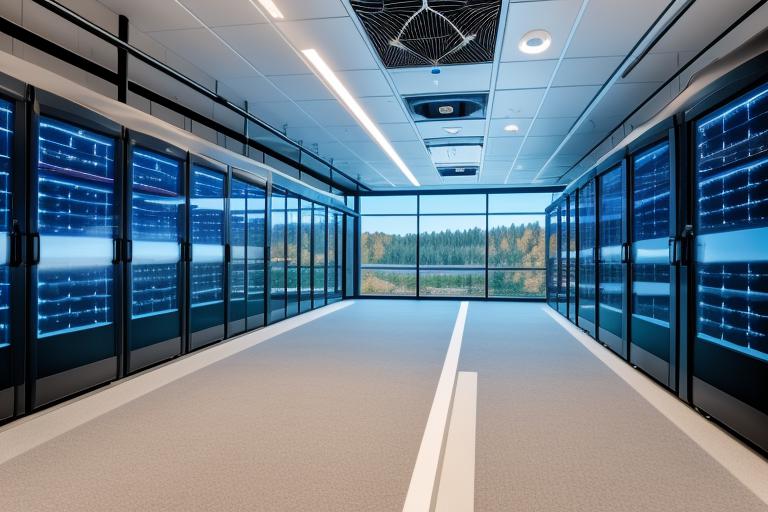Discover the transformative potential of AI in predicting HVAC system failures in data centers. Learn how AI technology can improve reliability, reduce downtime and optimize energy efficiency.

Using AI to Predict HVAC Failures in Data Centers
Using AI to predict HVAC system failures in data centers will revolutionize management and operational efficiency. This article explores the integration of AI, highlighting its benefits, applications and steps to implement it effectively.
What is AI in HVAC Systems?
AI in HVAC systems involves using advanced algorithms and machine learning techniques to monitor and analyze system performance data. This technology predicts potential failures, optimizes maintenance schedules, and increases overall system efficiency. AI-driven HVAC systems are becoming essential in data centers due to their ability to process large amounts of data in real time.
What is the role of AI in predicting HVAC failures?
AI plays a key role in predicting HVAC failures by analyzing data from sensors and historical performance records. Machine learning algorithms identify patterns and anomalies that indicate impending problems. This proactive approach enables timely maintenance interventions, avoiding system breakdowns and ensuring continuous data center operations.
Why Use AI for HVAC Failure Prediction?
Using AI for HVAC failure prediction provides several benefits:
- Downtime is reduced: AI provides early warnings, enabling proactive maintenance.
- Cost savings: Preventive maintenance reduces repair costs and extends equipment life.
- Energy efficiency: AI optimizes HVAC operations, reducing energy consumption.
- Reliability: Continuous monitoring and predictive analytics improve system reliability.
Where should AI be applied in data center HVAC systems?
AI can be applied to various components of data center HVAC systems, including:
- Air Handling Units (AHUs): Monitoring air flow and temperature to ensure optimal conditions.
- Chillers: Assessing cooling performance and potential failures.
- Cooling Towers: Analyzing water flow and temperature for efficient cooling.
- Air Distribution Systems: To evenly distribute the cooled air.
- Monitoring and control systems: Integrating AI for centralized control and real-time monitoring.
How to Implement AI for HVAC Failure Prediction?
Implementing AI for HVAC failure prediction involves several steps:
- Install IoT sensors: Collect real-time data on temperature, humidity, airflow and device performance.
- Use machine learning algorithms: Analyze data to identify patterns and predict failures.
- Integrate AI software: Seamlessly integrate AI with existing HVAC systems for real-time monitoring.
- Continuous monitoring: Regularly update AI models with new data to maintain accuracy.
- Collaborate with experts: Work with AI and HVAC experts to improve and optimize the system.
What are the latest AI technologies in HVAC?
Latest AI Technologies in HVAC:
- Predictive maintenance software uses advanced algorithms to predict equipment failures and recommend optimal maintenance schedules. Machine learning is used to detect anomalies in system performance and detect differences.
- Machine Learning for Anomaly Detection: Detects anomalies in system performance.
- AI-based energy management systems: Optimize energy use and efficiency.
- IoT sensors: Provide real-time data for AI analysis.
- Cloud-based AI platforms: Enable remote monitoring and control of HVAC systems.
What are the advantages & disadvantages of using AI in HVAC?
Benefits:
- Improved reliability: Early maintenance reduces unexpected failures.
- Cost efficiency: Low maintenance and repair costs.
- Improved energy efficiency: AI optimizes system performance, reducing energy consumption.
- Proactive maintenance: Early detection of problems prevents major breakdowns.
Disadvantages:
- High initial cost: AI systems are expensive to implement.
- Complex integration: Integrating AI with existing systems may require significant effort.
- Ongoing Monitoring: Continuous updates and adjustments are required for optimal performance.
How to optimize AI for HVAC systems?
Optimizing AI for HVAC systems includes:
- Regular updates: Continuously update AI models with new data.
- Accurate data collection: Use high-quality sensors for accurate data.
- Continuous Training: Train AI algorithms to improve prediction accuracy.
- Expert collaboration: Work with AI and HVAC experts to improve system performance.
FAQ
What is the benefit of using AI in HVAC systems?
Using AI in HVAC systems increases operational efficiency and reliability. AI enables predictive maintenance, reduces downtime and optimizes energy consumption. This leads to significant cost savings and more stable operation in data centers.
How does AI predict HVAC failures?
AI predicts HVAC failures by analyzing data from sensors and historical performance records. Machine learning algorithms identify patterns and anomalies that indicate potential problems. This enables early warnings and preventive maintenance, reducing the risk of system breakdowns.
What are the challenges of implementing AI in HVAC systems?
Implementing AI in HVAC systems presents challenges such as high initial costs, complex integration, and the need for continuous monitoring and adjustments. Despite these challenges, the long-term benefits of improved efficiency and reliability often outweigh the initial hurdles.
How can AI improve energy efficiency in data centers?
AI improves energy efficiency in data centers by optimizing HVAC operations. It analyzes real-time data to adjust cooling levels, reducing unnecessary energy consumption. Predictive maintenance also keeps systems running efficiently without unexpected failures, further saving energy.
What are the future trends in AI for HVAC systems?
Future trends in AI for HVAC systems include the use of cloud-based AI platforms, advanced predictive maintenance software, and more advanced machine learning algorithms. These trends aim to further improve efficiency, reliability and stability in HVAC operations.
Conclusion
Incorporating AI to predict HVAC system failures in data centers provides significant benefits such as reduced downtime, lower maintenance costs and improved energy efficiency. By using advanced AI technologies, data centers can ensure optimal HVAC performance and stability. As AI continues to evolve, its role in HVAC systems will become more complex, driving innovation and efficiencies across the industry.
Leave a Reply